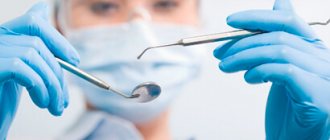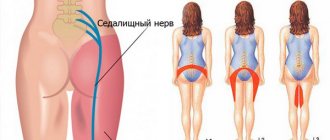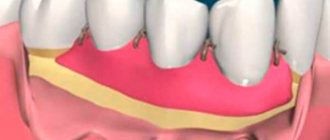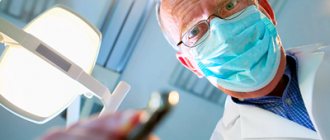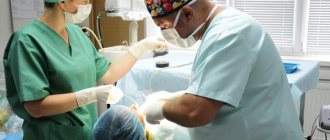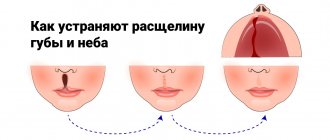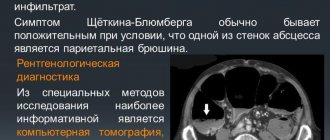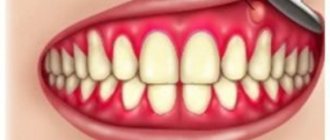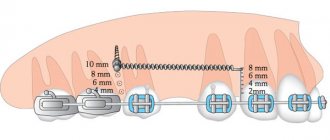Who is an oral and maxillofacial surgeon?
This specialist specializes in the surgical treatment of congenital and acquired pathologies of the jaw, face and neck. It not only restores the damaged functions of anatomical structures, but also eliminates cosmetic defects, that is, it returns the previous appearance.
However, he should not be confused with a plastic surgeon. The latter treats healthy people, he works on aesthetics, improves natural beauty. But the maxillofacial surgeon solves precisely medical problems. Its main goal is to improve health and restore the appearance that was before injury or illness. It primarily works with bone rather than soft tissue.
The doctor not only operates, he is engaged in postoperative treatment and rehabilitation of the patient, accompanying him until full recovery. Responsibilities of an oral and maxillofacial surgeon:
- interview and examination of the patient;
- conducting a diagnostic examination, including x-rays, CT scans, laboratory tests, allergy tests;
- choosing the most optimal treatment method;
- performing surgery;
- prevention of postoperative complications.
Preliminary preparation for procedures
It is necessary to carefully prepare for surgery. Preliminary preparation includes a full range of diagnostic measures, including the collection of various tests. Mandatory laboratory tests include clinical and biochemistry blood tests, as well as a general urine test. The doctor may prescribe a hormonal examination, scrapings from the epidermis in the affected area, computed tomography or magnetic resonance imaging, radiography or radiovisiography. All this will help the maxillofacial surgeon see the exact picture of the disease and select the most appropriate treatment.
Before the operation itself and in the postoperative period, you must strictly follow the doctor’s recommendations to avoid complications.
What diseases does an oral and maxillofacial surgeon treat?
Its competence includes the elimination of congenital and acquired defects, diseases of inflammatory, traumatic or tumor origin that are not amenable to conservative therapy. These include:
- injuries of the facial skeleton, teeth;
- pathologies of the salivary glands;
- cleft palate, cleft lip;
- dystopic, impacted and supernumerary teeth;
- small lower jaw;
- diseases of the mandibular joint: arthritis, arthrosis, articular disc dysfunction;
- inflammatory processes in the jaw area, facial skeleton: abscesses, phlegmon;
- osteomyelitis, periostitis, periodontitis;
- odontogenic benign and malignant tumors: dental cyst, odontoma, adamantinoma and others;
- malocclusion that cannot be corrected with orthopedic treatment.
The doctor performs planned and emergency operations. The latter are required for patients injured in road accidents, accidents, or military operations. Elective surgeries are more often prescribed for tumors, inflammatory processes and congenital anomalies.
What types of procedures are classified as maxillofacial surgery?
The activities of a maxillofacial surgeon can be divided into two main areas according to the criterion of urgency.
First, he surgically rids patients of birth defects and provides routine treatment. Preliminary preparation for such operations, including examinations, takes some time. Such “non-urgent” problems include many dental diseases, congenital defects, tumor formations, etc. As for congenital pathologies (“cleft palate”, “cleft lip”, tongue aplasia), they should be eliminated in early childhood during avoiding the development of psychological problems in the child.
Secondly, oral and maxillofacial surgery deals with emergency cases when, as a result of injury, accident or accident, a person acquires a defect in the face, neck or jaw, and when it is necessary to restore vital functions (respiratory, chewing, speech) and correct appearance through surgical intervention .
The scope of practice of an oral and maxillofacial surgeon includes procedures such as:
- taking anamnesis;
- external examination of the patient;
- conducting diagnostic studies and making a final diagnosis;
- surgical intervention;
- monitoring the healing process;
- carrying out preventive measures to avoid complications, etc.
Among the most popular surgical procedures in the maxillofacial area are:
- rhinoplasty;
- otoplasty;
- blepharoplasty;
- maxillary sinusotomy;
- prosthetics;
- osteosynthesis;
- removal of various tumors;
- circular facelift;
- contour plastic surgery.
During surgery, surgeons use the most modern equipment and materials, making operations less traumatic. This shortens the recovery period and helps reduce the likelihood of noticeable tissue scarring after surgery.
Requirements
The specialist must receive a higher medical education in the specialty “maxillofacial surgery”. During the training he acquires the following theoretical and practical knowledge:
- studies anatomy and physiology, especially the maxillofacial region and neck;
- is trained in diagnostic methods;
- studies all maxillofacial pathologies;
- learns to perform operations: open abscesses and phlegmons, excise tumors, perform osteosynthesis;
- studies primary surgical treatment and much more.
The main treatment methods of a maxillofacial surgeon are surgical. He must master them thoroughly, use minimally invasive technologies and modern materials to avoid the formation of scars. The outcome of treatment and demand among patients depend on his competence.
To become a good oral and maxillofacial surgeon, you need not only experience, but also constant training. You can improve your knowledge and skills, as well as receive the appropriate supporting document, through advanced training courses at the Academy of Professional Standards.
Rehabilitation after maxillofacial surgery
Table of contents
- When operations are required
- Indications for operations
- Preparing for surgery
- Contraindications
- Features of rehabilitation after maxillofacial surgery
- Advantages of rehabilitation at MEDSI
Maxillofacial surgery is a field
dedicated to the treatment of inflammatory diseases of the hard and soft tissues of the face and neck, elimination of the consequences of injuries, removal of malignant tumors, acquired and congenital defects of the jaws, head, oral cavity and other areas. Rehabilitation in this area is often no less important than the therapy itself. It is recovery that provides all the conditions for a person’s full return to active social life: work, hobbies, communication with friends, etc.
At this stage, not only surgeons, but also other specialists can get involved in the work: dental therapists, orthodontists, psychologists, etc. Rehabilitation of patients in maxillofacial
surgery is carried out exclusively by experienced doctors
who have all the necessary knowledge and skills and develop individual programs for each person.
When operations are required
Maxillofacial surgery is a broad field in which operations are relevant for a large list of pathological conditions and diseases. Today, modern techniques are used to reduce the duration of the recovery period and reduce the risks of side effects and complications.
The main situations requiring intervention include:
- Inflammatory processes in the maxillofacial area. Doctors treat radionecrosis of the jaws, osteomyelitis, rhinophyma, opening phlegmons and abscesses, carbuncles and boils, sinusotomy, etc.
- Traumatic injuries. Surgeons perform osteosynthesis of bones for fractures, plastic surgery of the condylar process, etc.
- Congenital anomalies. Doctors eliminate deformities of the maxillofacial area, congenital jaw defects, remove cysts and fistulas of the neck, treat joint pathologies, perform plastic surgery for congenital cleft lip, etc.
- Neuritis and neuralgia
- Benign formations: salivary gland cysts, tumors (hemangiomas, lymphangiomas, etc.)
Also, maxillofacial surgery is aimed at reconstructing various areas: the orbit, the zygomatico-orbital complex, etc. Doctors perform soft tissue plastic surgery, osteoplasty, free tissue transplantation, correction of lacrimal drainage disorders, removal of excess skin, rhinoplasty, formation of eyelid folds, endo- and ectoprosthetics, etc. .
Indications for operations
The main indications for interventions are:
- Congenital deformities: underdeveloped or very developed jaw and malocclusion
- Fractures of the zygomatic bones, eye socket, jaws and nasal bones
- Diseases of the oral cavity: inflammatory processes in the glands and joints, difficult teething, phlegmon, etc.
- Elimination of consequences after syphilis, cancer and other diseases
- Congenital soft tissue defects: cleft lips, palate, etc.
- Age-related deformations on the skin, lips, neck, etc.
- Inflammatory processes after incorrect injections and other procedures
- Tumors and tumor-like formations
Also, operations in maxillofacial surgery can be carried out according to the wishes of the patient, due to dissatisfaction with his own appearance.
Preparing for surgery
Preparation for any intervention includes:
- Inspection.
The doctor examines the existing pathologies in detail - Consultation with the operating surgeon.
It details the nature of the upcoming operation, its duration, methods used and results. The doctor must take into account all the patient’s wishes regarding the nature of the intervention. The patient is introduced to possible complications and side effects - Comprehensive examination.
It includes urine and blood tests, chest X-ray and ECG. Electroencephalography, rhinopneumometry and other examinations may also be performed. Comprehensive diagnostics allows you to determine the general health of the patient and identify contraindications to intervention (if any) - Taking photographs.
If necessary, videographic analysis of appearance, facial anthropometry and other manipulations are also carried out - Consultations with doctors of narrow specializations.
If necessary, otolaryngologists and other specialists are involved in the work - Consultation with an anesthesiologist.
At the appointment, the doctor selects the optimal anesthesia option. Operations can be performed both under local anesthesia and general anesthesia. The method of anesthesia is determined in accordance with the current condition of the patient, the extent of the intervention and other factors
Contraindications
General contraindications include:
- chronic and acute infectious diseases
- serious mental disorders
- severe disorders of the gastrointestinal tract
- pustular lesions in the area of intervention
- elevated body temperature
- general poor health
- menstruation
- pregnancy
There are also local contraindications. The operation should be abandoned if the degree of deformation is insignificant and there is no functional impairment, when the aesthetic factor is not of fundamental importance (for example, in the elderly). Intervention should be postponed in case of inflammatory processes in the affected area. Also contraindicated are inflammations in the jaws, nasal cavity, and nearby lymph nodes.
Features of rehabilitation after maxillofacial surgery
Recovery often plays a decisive role in the success of all processes and the degree of satisfaction of both the patient and the surgeon. At the same time, it is associated with a number of difficulties caused by the restoration of not only the functions of various parts of the body, but also their aesthetics. Often, medical rehabilitation in surgery is carried out with mandatory psychological support.
Recovery features also include:
- The need for joint work of doctors of various profiles. Restorative measures can be carried out by dentists (orthopedists and orthodontists), ENT specialists, neurologists, etc.
- Integrated and individual approach. The rehabilitation program for patients in surgery is often developed and prepared in advance and includes a whole range of different activities. These include: drug support, physiotherapy, work with a psychologist, etc.
- The need to restore the ability to breathe, swallow, chew, speak, etc.
- The need to eliminate traces of interventions. Cosmetic defects can have a serious impact on a person's quality of life. For this reason, special attention is paid to the elimination of scars. When performing operations on the maxillofacial area, surgeons select modern technologies in advance that leave virtually no traces
Important! A competent approach to rehabilitation in maxillofacial surgery, planning of all activities, close cooperation of doctors of related specialties can ensure a favorable prognosis and high quality of life for the patient after the intervention. It is also very important that the patient himself is ready to follow all the recommendations of specialists and strictly follow the instructions given by them during the recovery period.
Advantages of rehabilitation at MEDSI
- Newest technologies.
In our clinics, operations are performed using modern techniques, which allows us to shorten the rehabilitation period even after serious interventions. Rehabilitation treatment is also carried out using the latest technologies: physiotherapy, massage, etc. - Doctors of international level.
Our specialists are constantly studying new technologies and improving their skills. Doctors are fluent in well-known rehabilitation techniques that allow for rapid recovery, and also develop their own programs - Team approach and comprehensive programs.
One patient is observed by several doctors at once. This allows us to guarantee effective support even with concomitant diseases and disorders. If necessary, consultations are held - Opportunities for recovery at any stage.
All necessary manipulations can begin already in intensive care conditions - Recovery in a hospital, outpatient, remotely at home.
We also use SMART telerehabilitation technologies. Remote recovery may include classes with a speech therapist, psychologist, psychotherapist and other specialists and is provided on a convenient schedule with constant support - Opportunities to work with children.
We offer programs that are designed for even the youngest patients
If you are interested in rehabilitation in maxillofacial surgery in Moscow, call +7 (495) 7-800-500. The specialist will tell you about its features and answer all questions.
Pros and cons of the profession
Oral and maxillofacial surgery is one of the highest paid branches of medicine, which is a definite advantage. Experienced doctors are in demand and have good career prospects. But there are also disadvantages:
- high level of responsibility;
- psycho-emotional and physical stress;
- irregular working hours;
- complex and painstaking work, since the facial zone is an abundance of blood vessels and nerve endings that cannot be touched under any circumstances;
- low level of technical equipment in public clinics, which limits the doctor’s capabilities.
The concept of maxillofacial surgery
An oral and maxillofacial surgeon is a specialist who combines a plastic surgeon and a dentist, as he can solve problems in both areas. As for dentistry, maxillofacial surgeons are used for surgical treatment in the presence of impacted teeth and other serious pathologies. These specialists help eliminate problems associated with tumor formations in the face, as well as pathologies of the facial bones. This can already be attributed to the field of plastic surgery.
The areas of the face, neck and jaw are what are constantly in sight, and the slightest defects will be visible to others. This can cause a person both psychological and social problems. Defects of the maxillofacial region can be congenital (for example, cleft lip) or acquired, for example, as a result of trauma. Correction of such pathologies is the field of activity of the maxillofacial surgeon.
A specialist in this field must have extensive experience, as he has great responsibility. There are many blood vessels and nerve endings in the facial area, and the slightest carelessness can lead to serious negative consequences. Therefore, when choosing an oral and maxillofacial surgeon, it is very important to pay attention to his work experience and patient reviews.
Dentists at our clinics refer patients to an oral and maxillofacial surgeon at the Central Research Institute of Dentistry.
What personal qualities should an oral and maxillofacial surgeon have?
The work of a specialist is associated not only with physical, but also with psycho-emotional stress. He must have stress resistance and endurance. In addition to these qualities, others will be required:
- determination;
- persistence;
- responsibility;
- attention to details;
- desire to help the patient.
The surgeon performs quite intricate work, so he will need developed fine motor skills. He should not suffer from tremors of the limbs or musculoskeletal diseases, since these pathologies can put an end to his career.
Career prospects
Oral and maxillofacial surgeons work in large hospitals, specialized clinics, private centers for oral and maxillofacial surgery, and dentistry. In small settlements, the profession is not in great demand, so there is a greater chance of finding a job in large cities.
Good specialists can work in private medical institutions, specialized centers for maxillofacial surgery, and research institutes. It may be difficult to start your own business, as you will need to purchase expensive equipment.
TMJ Arthritis: Simple Inflammation or Something More?
As all doctors know, the ending -itis in any term or diagnosis means inflammation. In the case of arthritis, the inflammatory process is determined in the joint. Since the TMJ connects the temporal and jaw bones, the pathology manifests itself in the form of acute, sharp pain radiating to the ear or temple. In the same area, swelling and redness of the skin and a temperature reaction are observed.
Arthritis of the TMJ can be a consequence of an infection, injury, or a manifestation of a general disease, including an autoimmune one. In this case, inflammation does not go away without a trace. Functional tissues melt and are replaced by connective tissue, which does not allow the joint to work as before, to move the jaw, and dental and other problems arise. Often occurring arthritis of the TMJ entails the development of irreversible processes. In this case, the disease responds well to treatment. Sometimes antibiotic therapy, NSAIDs, steroids and physical therapy are enough.
Where to study to become an oral and maxillofacial surgeon
It is necessary to graduate from a higher educational institution. First, you need to study at the faculty of Pediatrics or Dentistry, and then complete a residency in Maxillofacial Surgery.
Specialists who have had a break in their work experience will need to undergo professional retraining in order to receive permission to work.
The Academy of Professional Standards conducts professional retraining courses lasting 3.5 months. Upon completion, the medical specialist receives a standard diploma. After passing accreditation, he can continue to work in his specialty.
Who is a dentist surgeon
A dental surgeon is a specialist who graduated from a higher medical school and completed residency in the specialty “Surgical Dentistry”. This is a doctor who not only removes teeth, he performs complex maxillofacial surgeries that eliminate serious problems in the oral cavity, aimed at eliminating defects and preserving the integrity of the dentition.
By the nature of his work, the surgeon is in close contact with dentists of other specialties: prosthetist, implantologist, therapist, hygienist, etc. By performing their job duties, surgical doctors daily improve the quality of life of patients scheduled for scheduled operations. In addition, they provide necessary treatment in emergency situations.
